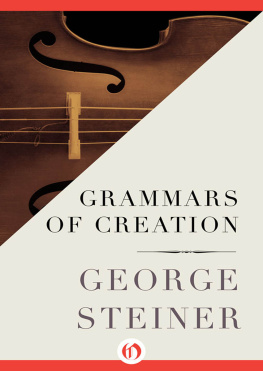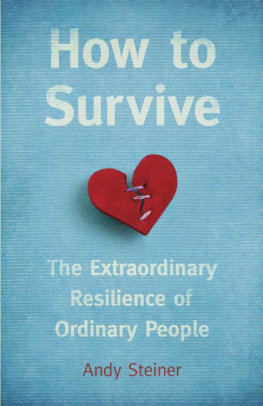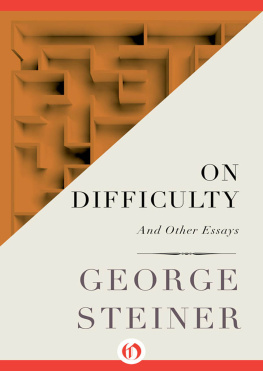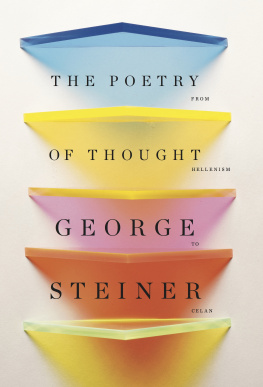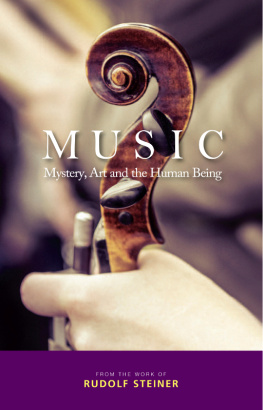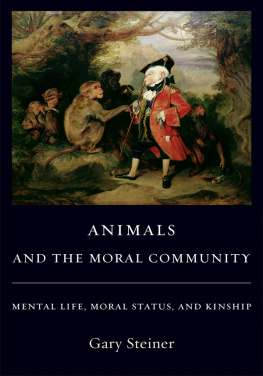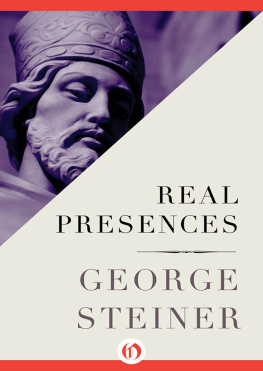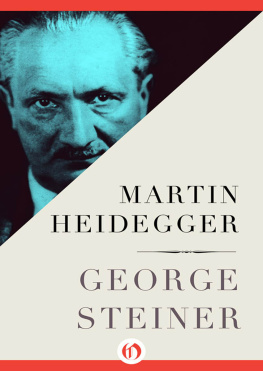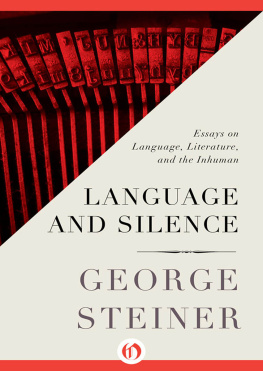Grammars of Creation
Originating in the Gifford Lecures for 1990
George Steiner

ACKNOWLEDGEMENTS
My thanks are due to the Electors who did me the honour of inviting me to deliver the Gifford Lectures for 1990. During those taxing but rewarding weeks, the University of Glasgow was unfailingly hospitable. Professor Alexander Brodies gently ironic witness and comments proved invaluable. Without the hectoring generosity and friendship of the late Professor Robert Carroll, the recasting of those lectures into this book might never have come about.
Its material arises very directly from work in the doctoral seminar in Comparative Literature and Poetics which I had the privilege of directing at the University of Geneva during a quarter of a century. The voices of its participants, many of whom returned year after year, are present throughout the argument. Students became friends and colleagues. This is true most particularly of Aminadav Dyckman whose scholarly scruple, linguistic range and critical acumen gave to the later years of the seminar much of its tenor. It is to him and to all around that table that this book is dedicated.
Heartfelt thanks also to Roger Cazelet of Faber and Faber and to Margaret Otzel of Yale University Press for their editorial authority.
George Steiner
Cambridge, April 2000
Contents
I
We have no more beginnings. Incipit: that proud Latin word which signals the start survives in our dusty inception. The medieval scribe marks the opening line, the new chapter with an illuminated capital. In its golden or carmine vortex the illuminator of manuscripts sets heraldic beasts, dragons at morning, singers and prophets. The initial, where this term signifies beginning and primacy, acts as a fanfare. It declares Platos maximby no means self-evidentwhereby in all things natural and human, the origin is the most excellent. Today, in Western orientationsobserve the muted presence of morning light in that wordthe reflexes, the turns of perception, are those of afternoon, of twilight. (I am generalizing. My argument, throughout, is vulnerable and open to what Kierkegaard called the wounds of negativity.)
There have been previous senses of ending and fascinations with sundown in Western culture. Philosophic witness, the arts, historians of feeling report on closing-times in the gardens of the West during the crises of the Roman imperial order, during the apocalyptic fears at the approach of the first millennium A.D ., in the wake of the Black Death and the Thirty Years War. Motions of decay, of autumn and failing light have always attached to men and womens awareness of physical ruin, of common mortality. Moralists, even prior to Montaigne, pointed out that the newborn infant is old enough to die. There is in the most confident metaphysical construct, in the most affirmative work of art a memento mori, a labour, implicit or explicit, to hold at bay the seepage of fatal time, of entropy into each and every living form. It is from this wrestling-match that philosophic discourse and the generation of art derive their informing stress, the unresolved tautness of which logic and beauty are formal modes. The cry the great god Pan is dead haunts even those societies with which we associate, perhaps too conventionally, the gusto of optimism.
Nevertheless, there is, I think, in the climate of spirit at the end of the twentieth century, a core-tiredness. The inward chronometry, the contracts with time which so largely determine our consciousness, point to late afternoon in ways that are ontologicalthis is to say, of the essence, of the fabric of being. We are, or feel ourselves to be, latecomers. The dishes are being cleared. Time, ladies and gents, time. Valediction in the air. Such apprehensions are the more compelling because they run counter to the fact that, in the developed economies, individual life-spans and expectancies are increasing. Yet the shadows lengthen. We seem to bend earthward and towards night as do heliotropic plants.
A thirst for explanation, for causality, inhabits our nature. We do want to know: Why? What conceivable hypothesis can elucidate a phenomenology, a structure of felt experience, as diffuse, as manifold in its expressions, as that of terminality? Are such questions worth asking seriously, or do they merely invite vacuous high gossip? I am not certain.
Inhumanity is, so far as we have historical evidence, perennial. There have been no utopias, no communities of justice or forgiveness. Our current alarmsat the violence in our streets, at the famines in the so-called third world, at regressions into barbaric ethnic conflicts, at the possibility of pandemic diseasemust be seen against the background of a quite exceptional moment. Roughly from the time of Waterloo to that of the massacres on the Western Front in 191516, the European bourgeoisie experienced a privileged season, an armistice with history. Underwritten by the exploitation of industrial labour at home and colonial rule abroad, Europeans knew a century of progress, of liberal dispensations, of reasonable hope. It is in the afterglow, no doubt idealized, of this exceptional calendarnote the constant comparison of the years prior to August 1914 with a long summerthat we suffer our present discomforts.
When, however, allowance is made for selective nostalgia and illusion, the truth persists: for the whole of Europe and Russia, this century became a time out of hell. Historians estimate at more than seventy million the number of men, women, and children done to death by warfare, starvation, deportation, political murder, and disease between August 1914 and ethnic cleansing in the Balkans. There have been hideous visitations of pestilence, famine, and slaughter before. The collapse of humaneness in this twentieth century has specific enigmas. It arises not from riders on the distant steppe or barbarians at the gates. National Socialism, Fascism, Stalinism (though, in this latter instance, more opaquely) spring from within the context, the locale, the administrative-social instruments of the high places of civilization, of education, of scientific progress and humanizing deployment, be it Christian or Enlightened. I do not want to enter into the vexed, in some manner demeaning, debates over the uniqueness of the Shoah (holocaust is a noble, technical Greek designation for religious sacrifice, not a name proper for controlled insanity and the wind out of blackness). But it does look as if the Nazi extermination of European Jewry is a singularity, not so much in respect of scaleStalinism killed far morebut motivation. Here a category of human persons, down to infancy, were proclaimed guilty of being. Their crime was existence, the mere claim to life.
The catastrophe which overtook European and Slavic civilization was particular in another sense. It undid previous advances. Even the ironists of the Enlightenment (Voltaire) had confidently predicted the lasting abolition of judicial torture in Europe. They had ruled inconceivable a general return to censorship, to the burning of books, let alone of heretics or dissenters. Nineteenth-century liberalism and scientific positivism regarded as self-evident the expectation that the spread of schooling, of scientific-technological knowledge and yield, of free travel and contact among communities would bring with them a steady improvement in civility, in political tolerance, in the mores of private and public business. Each of these axioms of reasoned hope has been proved false. It is not only that education has shown itself incapable of making sensibility and cognition resistant to murderous unreason. Far more disturbingly, the evidence is that refined intellectuality, artistic virtuosity and appreciation, scientific eminence will collaborate actively with totalitarian demands or, at best, remain indifferent to surrounding sadism. Resplendent concerts, exhibitions in great museums, the publication of learned books, the pursuit of academic research both scientific and humanistic, flourish within close reach of the death-camps. Technocratic ingenuity will serve or remain neutral at the call of the inhuman. The icon of our age is the preservation of a grove dear to Goethe within a concentration camp.

